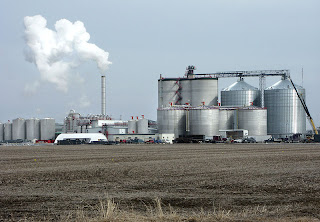 There are plenty of studies that have looked at the benefits of ethanol production on the U.S. economy. But those are just numbers and lack any kind of personal perspective.
There are plenty of studies that have looked at the benefits of ethanol production on the U.S. economy. But those are just numbers and lack any kind of personal perspective.Over the last year or so I have bookmarked several news stories that go beyond the numbers and tell the story of the people and industries that are benefiting from ethanol.
These days, the smell of money is the slightly acrid scent of fermenting corn that occasionally wafts over town.
Here in Iowa, and across a growing swath of the U.S. Midwest, making ethanol has meant a second chance for a rural economy that lives and breathes corn.
"This town was dying a slow death," said Craig Brownlee, a third-generation corn farmer from Emmitsburg, located northwest of Des Moines. "We weren't making any money and we were living off crop subsidies. Now, people are spending money like they haven't in a long time. There's a buzz around town."
Ethanol helps a small town bloom
North Dakota's booming ethanol industry is providing feed that cattle find tasty and ranchers find affordable - so far.
"The byproduct was a pretty good buy last year, but I'm not sure where they're going to price it this year," said Shawn Arndorfer, who owns a cattle feedlot near Hettinger and manages a second one near Scranton. "There's enough demand for the byproduct that I think it will probably push prices up a little bit."
The byproduct of corn ethanol production - called distillers grains - can replace some of the grain corn and protein supplements in a cow's diet. "Typically it's cheaper than the same amount of corn (and) soybean meal, whatever protein source you're using," said Greg Lardy, a beef cattle specialist with the North Dakota State University Extension Service.
"In Nebraska, South Dakota and Iowa, where they've got huge amounts of byproduct being produced, (cattle) numbers are really going up," he said.
Ethanol byproduct aiding North Dakota ranchers
The ethanol boom is helping more than farmers; it's also benefiting the nation's railroads. More than 75 percent of the ethanol produced in the U.S. is shipped by rail. In Minnesota, the state's dozen or so shortline railroads have struggled in recent years. Now ethanol is bringing them new life.
Small railroads see big ethanol future
The demand for storage space to accommodate what promises to be a plentiful corn crop is paying off for the companies that manufacture cylindrical grain bins.
Not since the early 1980s has Elevator Services & Storage Inc., in Beaverdam, Ohio, experienced such a strong demand for storage bins and grain handling equipment, said Walter Paxson, a sales manager for the company.
“This is mainly because of the ethanol boom and the additional corn production we are having,” Mr. Paxson said. His Allen County firm is nearing completion on a 425,000-square-foot silo addition to the elevator in Custar, Ohio, in Wood County.
Big corn crop a boon for silo makers
Expanding ethanol production in the US midwest is bumping up against constraints on barge capacity, an ageing fleet, and a waiting list for new units, a barge operator said on Wednesday.
"There is tremendous demand right now," Dave O'Loughlin, vice president of liquid sales at shipping firm Ingram Barge, told the National Ethanol Conference in Orlando.
US midwest ethanol bumps against barge capacity
Ethanol production provides economic benefits that are far wider reaching than just employment in ethanol plants or farmers benefiting from higher corn prices. Ethanol is providing benefits and jobs in supporting industries across the country. At a time when the national economy seem to be slowing, these benefits should not be ignored.




No comments:
Post a Comment